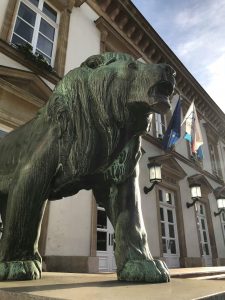All Together for Social Welfare?

After the French Revolution, psychiatry mingled at a local level with the fight against poverty, which meant fighting against a breeding-ground for family and personality disorders. Welfare shifted from religious bodies to local government. Since 1846, poverty-stricken families could contact the newly created communal “welfare offices” in their community of residence for pecuniary or material support. In 1932, the Luxembourg City welfare office moved from the neo-classical town hall – which had been inaugurated in 1838 – to the less central rue Saint-Esprit. Needy people did therefore not have to overcome the majestic lions, since these were erected only the same year. Members of the municipal council also sat in the national Parliament, often pursuing the same agenda in both arenas. With the introduction of universal suffrage in Luxembourg in 1919, the new equation ‘’Social = Political’’ turned into a major drive for political competition. In the 1920s, the socialist Léon Blum campaigned for the State orphanage in Parliament and for a municipal orphanage in the town council. Moreover, in 1928, the conservative address by town council-member Madame Beck, who pleaded for police action against begging children at Place d’Armes, would have well-matched the parliamentary debates on begging.
Numerous invoices in the municipal archive gave proof of payments for welfare services outside the city. In 1939, the municipality paid 186 francs as a monthly pension fee for an orphan from the city of Luxembourg hosted in the Grevenmacher home of the Franciscans, and comparable 600 francs for the 3rd trimester in the Red Cross Centre for Family Placement in Redange. Already in the 1920s, Blum had attacked the routine of placing orphans and abandoned children in institutions far away from the city, maintaining that the municipality had failed in its duty to guarantee its parentless children a fair treatment and a proper education.

With the rise of the nation-state, welfare became a cement of national cohesion. Numerous clubs, associations and philanthropic organisations regularly sent requests to Luxembourg’s capital, asking for subsidiaries and permission to gather funds through lotteries, raffles and street-collections for welfare purposes. On 6 July 1932, the press announced the creation by the city of Luxembourg of a “Central working group for social care, hygiene and welfare”, listing about 20 public and private organisations. It was designed to “unify actions for social care and hygiene”, and to acquire a “wider audience for material and moral support” for public welfare in the city. After the economic crisis in 1929, increasing pressure on welfare offices required sorting out the fake poor; also, to gain control over the smart poor, who tried to collect donations from several organisations simultaneously. On the opposite side of the spectrum, special invitations targeted the populations of the shameful poor, that is, citizens who preferred to endure cold and hunger, rather than to openly declare their need. Indeed, only since 1960, by the law on the National Solidarity Fund and under a set of conditions, were citizens in need entitled to receive support from the State
Findings are partially based on material from the Luxembourg City Archives and a letter from the Luxemburger Wort dated 6 July 1932.
